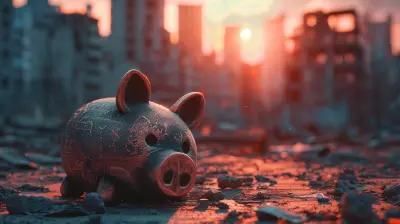The Domino Effect: How Small Markets Can Crash Global Economies
9 August 2025
Picture a row of dominoes, perfectly aligned. A small push on just one of them sets off a chain reaction, toppling every piece in its path. This is exactly how small markets can disrupt the global economy. What seems like an isolated financial hiccup in a tiny country or industry can send shockwaves throughout the world, shaking even the largest economies.
But how does a single market trigger a worldwide crisis? And why should you care about what happens in a seemingly insignificant financial sector on the other side of the world? Let's break it down.

The Butterfly Effect of Global Finance
The global economy is like a spider's web—delicate, intricate, and deeply interconnected. A small tremor in one section creates ripples across the entire structure. This interconnectedness means that even minor market disruptions can set off catastrophic consequences.Think of the 2008 financial crisis. It all started with the subprime mortgage market in the U.S.—a relatively small portion of the financial system. But when it crumbled, it dragged down global markets, leading to a full-scale financial meltdown.
The same thing happens with smaller economies or niche markets. When they fall, they can bring the giants down with them. 
How Small Markets Can Trigger Global Financial Chaos
1. Interconnected Investment Networks
In today's globalized world, financial institutions, corporations, and investors are all intertwined. Countries don’t operate in isolation anymore—what happens in one economy often impacts another.Take hedge funds and institutional investors, for example. They spread their money across various markets, seeking higher returns. If a small market collapses, these investors lose money, forcing them to liquidate assets in other markets, which drags down the entire financial system.
2. Banking and Credit Contagion
Banks are the lifeblood of economies. They lend money to businesses, governments, and individuals, keeping the financial system running. However, banks also invest in global markets. A crisis in a small market can hurt bank assets, reducing their ability to lend.Now, if a country's banking system weakens, foreign banks connected to it can suffer losses, causing a domino effect that spreads worldwide. The 1997 Asian Financial Crisis is a perfect example. It started in Thailand but quickly engulfed South Korea, Indonesia, and even Russia, severely impacting global markets.
3. Supply Chain Disruptions
In an era where supply chains span continents, a crisis in one country can halt production everywhere. Imagine a small nation producing an essential component for cars or smartphones. If its economy crashes, production slows or stops, leading to a worldwide shortage.A smaller economy’s downturn can shock supply chains, causing corporate losses, higher prices, and market instability.
4. Foreign Exchange and Currency Crashes
The foreign exchange market is an integral part of global finance. If a small nation’s currency collapses, it can trigger capital flight—when investors rapidly move their money out of the country to safer places.This devalues the currency even more, making imports more expensive and causing inflation. If foreign investors pull out funds on a large scale, it can destabilize major economies that are heavily invested in that market.
A perfect example? The Argentine peso crisis in 2001. It forced global investors to rethink emerging markets, leading to massive shifts in capital that affected economies worldwide. 
Real-World Examples of the Domino Effect in Action
1. The 1997 Asian Financial Crisis
What started in Thailand quickly engulfed other Asian economies. Investors panicked, pulling money out of emerging markets, causing rapid currency devaluations. From Asia, the crisis spread, weakening global financial markets.2. The 2008 Global Financial Crisis
As mentioned earlier, the failure of the U.S. subprime mortgage market triggered a global recession. The collapse of Lehman Brothers sent shockwaves across banking systems worldwide, proving just how interconnected financial markets truly are.3. Greece's Debt Crisis (2010-2015)
A single country’s debt problems threatened to break the entire Eurozone. Investors feared a ripple effect, where financial instability in Greece could lead to economic turmoil across Europe. The crisis led to bailouts, austerity measures, and long-lasting financial hardships.4. China’s Stock Market Crash (2015)
A massive sell-off in Chinese stocks resulted in panic across international markets. The fear? That China’s slowing economy would drag down global trade. Stock markets in the U.S. and Europe saw massive losses, proving that even a single nation's market crash can rattle the world.
Why Should You Care?
You might think, "This all sounds interesting, but how does it affect me?" Well, quite a lot, actually.- Investment Risks: If small markets collapse and trigger a global crisis, your 401(k), stocks, or mutual funds could take a hit.
- Higher Prices: Global supply chain disruptions can cause inflation, making everything from gas to groceries more expensive.
- Job Security: If businesses struggle due to financial turmoil, layoffs and pay cuts become more common.
- Economic Slowdowns: When global markets crash, countries enter recessions, leading to lower economic growth and reduced opportunities for businesses and employees.
Can This Domino Effect Be Prevented?
Now, the big question: Can we stop small market crashes from devastating the global economy? The answer isn’t straightforward, but here are a few possible solutions:1. Stronger Financial Regulations
Strict oversight of financial markets can prevent reckless lending and speculative bubbles, reducing the chances of smaller market collapses.2. Diversification in Investment Portfolios
If investors spread their assets across different sectors and regions, a crisis in one market won’t be as catastrophic.3. International Cooperation
When countries work together through financial safety nets (like the International Monetary Fund), they can prevent localized crises from becoming global disasters.4. Better Risk Management
Banks, corporations, and investors must adopt smarter risk strategies, ensuring that investments in emerging or small markets don’t lead to widespread financial instability.Final Thoughts
The global economy is more connected than ever, and small markets hold more power than most people realize. When one falls, the dominoes start toppling, creating financial chaos across the world.Understanding the domino effect isn't just for economists and policymakers—it's something everyone should be aware of. After all, what happens in a small market today could have a significant impact on your financial future tomorrow.
So next time you hear about a financial crisis in a "small" country, don't shrug it off. That tiny tremor might just be the start of something much bigger.
all images in this post were generated using AI tools
Category:
Financial CrisisAuthor:

Uther Graham
Discussion
rate this article
1 comments
Lanae Gibson
Small markets matter; their impact is often underestimated.
August 25, 2025 at 3:17 AM

Uther Graham
Absolutely, small markets play a crucial role in the global economy. Their interconnectedness means that disruptions can have far-reaching consequences.


